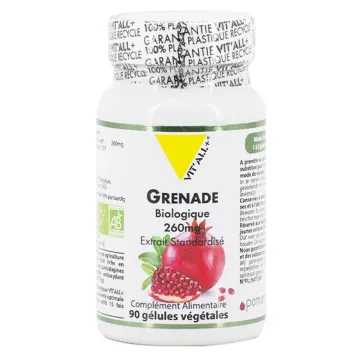
What is the pomegranate?
The pomegranate (Punica granatum) is an exotic fruit with a thick skin and numerous juicy seeds called arils. Native to the Middle East and the Mediterranean basin, it has been consumed for thousands of years for its medicinal and nutritional properties. Rich in powerful antioxidants, vitamins and minerals, pomegranates are recognized as a superfood for their beneficial effects on cardiovascular health, digestion and skin.
What are the benefits of pomegranates?
The pomegranate is a nutritional treasure trove, offering numerous health benefits:
How to eat pomegranate
Pomegranates can be incorporated into the diet in several forms:
Fresh: Its arils can be added to salads, desserts or smoothies.
In juice: Ideal for a concentrate of antioxidants and vitamins.
Powdered: Mix into shakes or yoghurts for a revitalizing effect.
In pomegranate seed oil: Used in cosmetics to nourish skin and hair.
Tip: To extract the seeds easily, cut the pomegranate in half and tap the rind with a wooden spoon.
Is pomegranate good for the heart?
Yes, pomegranates are a valuable ally for cardiovascular health, as they :
Reduces bad cholesterol (LDL) and increases good cholesterol (HDL).
Improves blood circulation and lowers blood pressure.
Prevents atherosclerosis, by preventing the build-up of plaque in the arteries.
Often recommended for people at risk of cardiovascular disease.
Does pomegranate aid digestion?
Yes, thanks to its high fiber content, it :
Facilitates intestinal transit and prevents constipation.
Stimulates the production of digestive enzymes, improving nutrient absorption.
Has anti-inflammatory properties, beneficial for people suffering from irritable bowel syndrome.
Ideal for light, efficient digestion.
Can pomegranate prevent certain cancers?
Yes, several studies suggest that it may slow the growth of cancerous cells, notably:
Breast: thanks to its hormone-regulating phytoestrogens.
Prostate: By inhibiting inflammation and cell proliferation.
Colon: By reducing oxidative stress and protecting DNA.
Its polyphenols and flavonoids make it a powerful cellular protector.
Is pomegranate good for skin and hair?
Yes, it is a cosmetic ingredient of choice, as it :
Stimulates collagen production, making skin firmer and more elastic.
Deeply moisturizes, reducing the signs of aging.
Promotes cell regeneration, reducing blemishes and imperfections.
Nourishes hair and strengthens the scalp thanks to its essential fatty acids.
Pomegranate seed oil is often included in anti-aging creams and serums.
Does pomegranate improve memory and cognitive capacity?
Yes, it is known to stimulate brain function:
Protects the brain from oxidative stress, delaying cognitive decline.
Improves concentration and memory thanks to its flavonoids.
Reduces the risk of neurodegenerative diseases such as Alzheimer's.
Ideal for students and senior citizens.
Is pomegranate good for women?
Yes, thanks to its phytoestrogen content, it :
Regulates hormones, relieving symptoms of premenstrual syndrome and menopause.
Improves fertility by balancing hormone levels.
Protects skin from hormonal changes, such as hormonal acne.
It is often recommended for women seeking a natural hormonal balance.
Does pomegranate help you lose weight?
Yes, it's an ideal slimming fruit, as it :
Reduces appetite thanks to its fiber content.
Regulates blood sugar levels, preventing insulin spikes responsible for fat storage.
Helps eliminate toxins by stimulating the liver and kidneys.
It is often included in detox cures and slimming programs.
Does pomegranate have any contraindications?
Although beneficial, it should be consumed with caution in certain cases:
May interact with certain medications, notably anticoagulants and hypotensive drugs.
Its juice can be acidifying, and should be avoided in cases of gastro-oesophageal reflux.
Pomegranates should be consumed in moderation by diabetics, as they contain natural sugars.
How much pomegranate can I eat in a day?
We recommend eating half a pomegranate or drinking a glass of juice (150-200 ml) a day, to enjoy its benefits without excess.
Can pomegranate be combined with other superfoods?
Yes, it is often combined with :
Turmeric and ginger: for enhanced antioxidant and anti-inflammatory benefits.
Chia and flax seeds: For a fiber and omega-3 boost.
Green tea: For optimal cellular and cardiovascular protection.